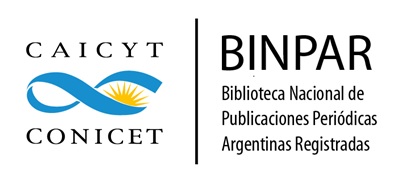Federico Moura and the dispute over the construction of meanings around bodies and gender roles during the last civic-military dictatorship and the democratic transition
Keywords:
Discourses, meanings, body, sexuality, military dictatorship, masculinities, national rockAbstract
In order to understand the role that Federico Moura played and what he meant -beyond his music- in the local Argentinean
music- in the Argentine local scene since 1981, when he started with his band Virus, it is important to contextualize him in a certain time and space from
Virus, it is important to contextualize him in a certain time and space based on research works that preceded research works that precede this one and books that will add a contribution to the reflection of the discursive act of the reflection of the artist's discursive act. What was happening with Virus -but above all with Federico Moura - had to do with his appearance and poise on stage.
Many considered it inappropriate that a "rocker" allowed himself to wear colors and dance while the streets continued to be militarized.
while the streets continued to be militarized.
Downloads
References
Butler, J. (1990). El género en disputa: Feminismo y la subversión de la identidad. Barcelona, España: Ediciones Paidós Ibérica.
Duizeide, J.B. (2019). Federico Moura, ironía y romanticismo. Ciudad Autónoma de Buenos Aires, Argentina: Patria Grande; Sudestada Editorial.
Foucault, M. (1971, 2005). El orden del discurso. Ciudad Autónoma de Buenos Aires, Argentina: Tusquets Editores.
Moura, M. (2014). Virus. Ciudad Autónoma de Buenos Aires, Argentina: Planeta.
Laboureau, G. y Lucena, D. (2016). Modo mata moda. Arte, cuerpo y (micro)política en los 80. La Plata, Buenos Aires, Argentina: Editorial de la Universidad Nacional de La Plata (EDULP).
Downloads
Published
How to Cite
Issue
Section
License
Copyright (c) 2021 Rocío Roig

This work is licensed under a Creative Commons Attribution-NonCommercial-ShareAlike 4.0 International License.
La aceptación de un original por parte de la revista implica la cesión no exclusiva de los derechos patrimoniales de los/as autores/as en favor del editor, quien permite la reutilización, luego de su edición (postprint), bajo una Licencia Creative Commons Atribución-NoComercial-CompartirIgual 4.0 Internacional (CC BY-NC-SA 4.0)
Acorde a estos términos, el material se puede compartir (copiar y redistribuir en cualquier medio o formato) y adaptar (remezclar, transformar y crear a partir del material otra obra), siempre que a) se cite la autoría y la fuente original de su publicación (revista y URL de la obra), b) no se use para fines comerciales y c) se mantengan los mismos términos de la licencia.
La cesión de derechos no exclusivos implica que luego de su edición (postprint) en Actas de periodismo y comunicación las/os autoras/es pueden publicar su trabajo en cualquier idioma, medio y formato; en tales casos, se solicita que se consigne que el material fue publicado originalmente en esta revista.
Tal cesión supone, también, la autorización de los/as autores/as para que el trabajo sea cosechado por SEDICI, el repositorio institucional de la Universidad Nacional de La Plata, y sea difundido en las bases de datos que el equipo editorial considere adecuadas para incrementar la visibilidad de la publicación y de sus autores/as.
Asimismo, la revista incentiva a las/os autoras/es para que luego de su publicación en Actas de periodismo y comunicación depositen sus producciones en otros repositorios institucionales y temáticos, bajo el principio de que ofrecer a la sociedad la producción científica y académica sin restricciones contribuye a un mayor intercambio del conocimiento global.






















